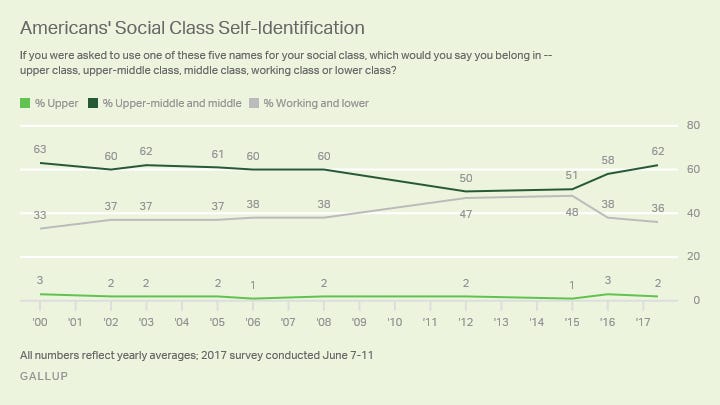Social class in America
We live in a class-stratified society, and we don't seem to understand it.
It’s impossible to explain class in America, and I’m going to fail to do it today. But I have to try, because…well, because living in a class-stratified society bothers me, and that forces me to talk about it.
America is a class-stratified society. Class looms so large over our society that we don’t even see it, like a roof that’s so big we think it’s the sky. Only once we finally step outside do we look back at the towering edifice and cry “Holy shit, I never knew that was there!”
I don’t mean to claim that living in Japan for a few years gave me a nuanced and complete understanding of American social stratification. That would be a ridiculous claim. Nor would I argue that Japan is a completely classless society. But when you see top college graduates marry construction workers and food service workers show up to dinner parties with private equity people, you start to realize that the world doesn’t have to be the way it was in the place and time in which you grew up.
Every society does class differently, but every society also thinks about it differently. Americans are famously fond of saying that we’re part of the middle class, but in fact a fair number of us identify as working or lower class:
What we almost never say is that we’re upper class. This is of course realistic if we decide to define “upper class” as the very wealthy. Perhaps the merely somewhat-wealthy — the “I make $192,000 but I live in San Francisco” crowd — would prefer to hide their privilege. When the rakes and pitchforks come for the $192,000-a-year crowd, it’s always helpful to be able to point up the hill, to the even nicer houses, and say “It’s not me, it’s the people making $500,000 a year!” And those people will find it helpful to point even further up the hill and say “It’s not me, it’s those even richer people!”, until everyone is pointing the finger at Jeff Bezos.
There are some vastly wealthy people in Japan, but by and large they hide it; they do not live in opulent mansions, they ride the subway. Extravagance is a social embarrassment. In America we choose to hide our wealth in plain sight, in the fractal nature of the power-law curve; we can’t be The Rich, since there’s always someone ten times as rich. Thus is our “middle-class society” maintained, despite the fact that some people are going into debt to buy school lunches.
In Old England, class was something everyone talked about and no one did anything about; in modern America, class is something no one talks about and no one does anything about.
But in fact, class in America is far more complex than this simple story, because income and wealth are far from the only things that define your social stratum in this country. There are at least three other important factors that I can think of off the top of my head — race, education, and occupation.
Back in the dark days of the political hellscape that was 2015-16, there was a ferocious battle among the online portions of the Democratic base over race versus class. This was really a proxy for the Bernie-Hillary fight — a debate over whether Dems should try to win the election by turning out more minorities or by making a bid for the non-college White voters who were increasingly drifting to the GOP, but who Bernie seemed to appeal to. But in any case, the correct answer, which both factions of activists realized but neither could let themselves admit, was obviously “both”, because race influences class very deeply.
This is hardly unique to America. But since we’re such a diverse country, our racial class dynamics are hellishly complex. How your race affects your social stratum in America depends not just on what race you are, but on the racial composition and political climate of your town. Being Asian American in small-town Alabama is different than being Asian American in Seattle, even if you do the same job and make the same salary. As for ethnicity, it matters a great deal in some situations; in others, not at all.
When a pundit in America talks about the “working class”, the image they conjure is often implicitly a racial one — a White guy in a hard hat. These, after all, were the swing voters in the political battles of the mid-to-late 20th century, the Reagan Democrats who flipped over culture war issues. But the actual working class of America in 2021 is very diverse — a majority of construction workers, for example, are Hispanic or Black at this point, though of course it varies by region.
Take a walk through the Mission in San Francisco. Pop into a Walgreens, and as likely as not, the clerk behind the counter will be a Hispanic woman. If there is a working class in America, she is certainly part of it. Then hop on the BART and ride downtown; as likely as not, the train conductor will be a Black man. If there is a working class in America, he is certainly part of it. But in the fables we tell about “the working class”, both of these people are invisible.
You’d think they’d be very visible to the Left — to the Bernie-voting young warriors who championed a class-first politics in 2016. But bizarrely, I find that these people often have in mind an entirely different image of the working class — a member of the educated, downwardly mobile, mostly White “precariat”. In other words…themselves. A deli worker who graduated from Michigan State but can’t figure out what to do with her humanities degree; a struggling public school teacher; a writer for a leftist magazine who gets priced out of superstar cities by dastardly tech workers, etc. It is to the rescue of this precariat and their frustrated expectations that the government must ride, with student loan relief and free college and so on.
Conservatives, of course, will scoff at this. To them, class is generally defined not by wealth or income, but by education. As the American electorate becomes ever more polarized by education, Republicans become ever more resentful of the scholar-gentry who shame them for not saying “Latinx”. For wealthy Republicans the resentment must be all the more galling — to think, some nonprofit loser in Portland exercising cultural hegemony over titans of industry!
It’s not like the Republicans don’t have a point here. Though the economic fortunes of college grads have faded a bit in recent years, the earnings premium for a four-year degree is still around 80%. Potential income is important; a sheepskin from a good school makes all the difference between a truly poor person and a temporarily embarrassed member of the upper middle class. There’s a real difference between someone who’s standing behind a cash register because that’s the best they can do to feed their family, and someone who’s there because they’re in denial about going to law school.
Still, throwing education into the maelstrom of American class just makes the whole thing more complicated. And then on top of that, there’s occupation. Karl Marx conceived of class as being closely tied to what you do for a living — the proletariat were wage-earning laborers, the petit bourgeoisie were small businesspeople, and so on. The modern economy has progressed vastly beyond anything old Karl knew; we have a kaleidoscope of engineers, low-paid service workers, unionized semi-skilled auto workers, financiers, gig workers, consultants, online cryptocurrency shills, and so on.
And yet despite this endlessly proliferating complexity, what you do for a living still matters for your class. A rich White boat dealer with a college degree is of a different class than an equally rich White software engineer who went to the same school. The biggest divide, though we don’t often talk about it, might be between knowledge workers and other workers; between those who benefit from the spillovers of ideas and capital that arise in superstar cities, and those who will do just as well living in the exurbs. Knowledge clusters have reshaped the entire geography of the nation; this has led to a divergence of class interests between the residents of the exurb and the denizens of the megalopolis.
Class in America is thus so complex, so multidimensional and fragmented, that it requires an enormous amount of cultural capital just to navigate. To decide whether someone is a suitable spouse for your child — perhaps the ultimate determinant of class in any society — requires solving a hard computational problem. You have to evaluate their income and their potential income; their wealth and their family’s wealth; their occupation and their career prospects; their race and their racial politics; and their educational attainment. And all the interactions between those things. And you have to do it all while studiously pretending to yourself that you live in a middle-class society where anyone can be anything they want to be.
And so we wander through our country as if in parallel realities. We walk through teeming, crowded cities where only a few other people really exist — the other residents of our tiny stratum. Our class equals are real to us, manifesting in living color — people we might laugh with, do deals with, make love with, confess our frustrations to. The members of adjacent classes are a bit less real — washed-out caricatures we deal with using simple heuristics. And the members of distant classes are mere shadows to us — moving objects to be avoided on the street, automated kiosks to service our economic needs, statistics in our daily news. The Walgreens cashier, the BART conductor — who could they ever be to you? And who could you ever be to them?




Great post. I'd add two things. First, there's no class solidarity here in the US. Instead, we have racial solidarity. Second, I think a set of habits and values define the middle class. My friends and family are all rich--incomes healthy multiples of the median household income, seven figure portfolios--but we all still work hard (even in retirement), invest carefully, save in-order-to-pay-cash, live monogamously and soberly, and eschew buying trophy cars and such.
The lowest ranked bart train operators make $72-85K a year, not counting extremely generous benefits and overtime pay. The median household income in SF is only 87k a year, and the national median household income is 68k. The BART conductor is not, in any meaningful sense, working class. He has a government job with extensive benefits, ironclad job security, and extremely high pay for his level of education.
The blindness to the immense privileges they dollop out to government workers is one of the more irritating features of the modern left, and one that actively prevents the good government their vision of the future requires.